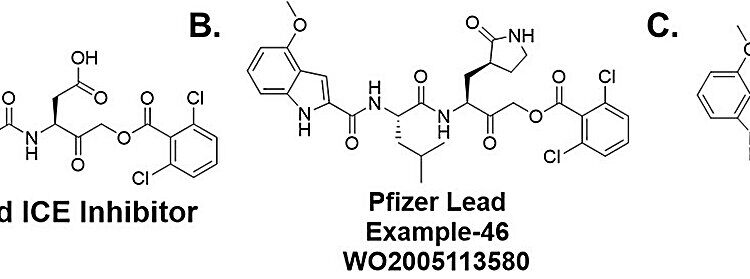Design of cysteine protease inhibitors. (A) Tripeptide-based interleukin-1β converting enzyme inhibitor. (B) Main compound of Pfizer coronavirus protease reported in WO2005113580. (C) The lead compound hydroxymethyl ketone Pfizer, PF-00835231. Credit: Antimicrobial agents and chemotherapy (2024). DOI: 10.1128/aac.00562-24
New research from the Salvino lab at the Wistar Institute, led by Professor Joseph Salvino, Ph.D., has identified a new series of SARS-CoV-2 Mpro inhibitors that could lead to potential new treatments for COVID -19 which, according to preclinical testing, effectively inhibits COVID-19 and creates synergy with existing anti-COVID therapies.
Their new discovery is detailed in the article, “Design of novel and highly selective SARS-CoV-2 protease master inhibitors,” published in the journal Antimicrobial agents and chemotherapy.
Despite the use of effective vaccines approved worldwide, COVID-19 continues to contribute to mortality and morbidity, a problem compounded by problems with access to vaccines and treatments. However, existing drug models used for the treatment of COVID-19 are amenable to drug interactions and the risk of incomplete viral inhibition.
To address this problem, Salvino, a medicinal chemist at Wistar, led a drug discovery team with the goal of improving the existing design of the Mpro inhibitor, an approach to viral therapy that seeks to prevent both Viral replication and drug resistance based on mutations by targeting a component of the virus that regulates its ability to spread. Since Mpro is not an easily mutated biological feature like a spike protein, inhibition of Mpro may help retain antiviral efficacy even between different variations.
The team used a drug discovery technique that applied an “electrophilic acyloxymethyl ketone warhead” – essentially a molecule designed to identify important binding regions with which a drug candidate compound would interact. Using their drug discovery process, Salvino and the team identified a new series of Mpro inhibitors with greater selectivity, that is, more reliable in producing an inhibitory effect, than the Mpro inhibitor Existing Mpro for COVID-19 on the market.
The group’s new compounds successfully inhibited viral replication in vitro against three different COVID variants, including in lung tissue. The compound also created synergy (meaning it achieved a strength greater than the sum of its parts) with other existing antivirals in the fight against the virus. In preclinical testing, no apparent toxicity was observed, providing a positive indication of the safety of the compound.
“We are very pleased to have identified such a promising new avenue for developing future therapies,” Salvino said. “As we continue to refine the chemistry through additional testing and optimization, we look forward to improving the potency of anti-coronavirus therapies.”
More information:
Adi NR Poli et al, Design of novel highly selective SARS-CoV-2 master protease inhibitors, Antimicrobial agents and chemotherapy (2024). DOI: 10.1128/aac.00562-24
Provided by the Wistar Institute
Quote: Scientists discover new series of SARS-CoV-2 Mpro inhibitors for potential new treatments against COVID-19 (October 8, 2024) retrieved October 8, 2024 from
This document is subject to copyright. Except for fair use for private study or research purposes, no part may be reproduced without written permission. The content is provided for informational purposes only.



